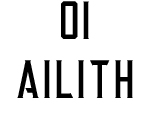
I asked you once if you thought you could ever love a robot, and that
your answer would determine your future happiness. I want to ask you
the same question regarding perception vs. reality. What’s more
important? Would you be happier knowing that what you experience is the
absolute truth rather than merely the product of your perception? What
if that truth was unpleasant, difficult? And the perception was
comfortable, safe? What is more important to you?
—Cindra, Letter to Omega

In the dream, I made my way through the waving grass of the emerald sea once more. The blades were brittle and dry, their tips crusted with the salt that permeated the air and seasoned my lips. My steps were slow and resolute—no longer the flight of a child.
I couldn’t see them, but I knew they were there, the others like me. Both human and machine, an involuntary legacy turned harbinger. And behind them, a cast of ninety-nine following in formation, heartless and soulless and free. Their power at my back was both soothing and terrifying, an expanse of dark water that was, for the moment, calm, but in whose depths lurked a terrible power.
The hundredth walked beside me, his hand clutching mine. His face was set, looking only forward, although the tightness with which he gripped my hand betrayed…what, I wasn’t sure. He didn’t feel like I did, but he knew fear. And grief.
My companions wound silently through the houses we passed. The buildings were ghosts, their presence only suggested by faint outlines and the berth we gave them. Both familiar and unfamiliar, their bricks were built from our collective memories, pressed into clay and mortar.
Had the houses always been there? I couldn’t remember.
Wraiths lingered in the doorways of these ghost-houses, trapped forever in their own time. Even through the veil of ages, they felt our presence, their pale fingers scrabbling against the lintel as their empty eyes searched for us, their voiceless mouths trembling in uncertainty. Further on, the buildings multiplied as epochs overlapped, and the specters’ gazes sharpened in accusation, epithets dripping from their tongues as their fingers tried to press the vision of us into their rheumy eyes.
From under those fingers, a sickly network of corruption spread, a viscous blackness creeping over their cheeks in spindly lines. As we passed them, they fell, a lament on their lips that cracked like thunder in our ears. The shadow-homes crumbled, some into ash, others into dust, all into ruin.
Doubles rose where the originals had fallen, one after the other in rapid succession, like an echo. They saw only each other, for we’d faded beyond their sight into obscurity. As we brushed past, they merely made a sign of protection against us, and were consoled.
Beyond the shades, the tree rose from a blanket of mist, solitary still in the green expanse. It was a familiar comfort, and something more, something that, for the first time, I almost understood. Our march toward it remained steady, deliberate. We all had a purpose there that must be fulfilled.
As our legion advanced on the tree, fear surged inside me that we would crush it. How could we not? We were an army, and one not of flesh. But there was no way to stem the tide—I couldn’t even stop the rhythm of my own feet. I had made our decision, and there was no going back.
Moments before impact, we split like a wave against rock, flowing around the immense trunk until we’d encompassed it. It was then that we stopped, and that I finally understood our purpose: protect the tree. Defend it at all costs, for at its base was the means of our survival, the only means left to us on the path we’d taken. We faced outward as one, our anticipation pointed and unpitying.
A sudden sigh stirred the air, and the earth shifted beneath our feet, heralding a blur of bodies as the red mist descended. Its bloody condensation gathered on the leaves of the tree and rained down on us, gods and monsters meeting at last.
The harvest had begun.